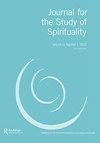Time, tides, and finding the still point in the turning world
IF 0.7
0 RELIGION
引用次数: 1
Abstract
Reflections. One of my favourite holiday destinations is the Isles of Scilly, a small archipelago 28 miles off the southern tip of Cornwall in the far southwest of the UK. There are five inhabited islands and numerous rocky islets. It is believed that they all once formed part of Ennor (Old Cornish for ‘Great Island’) which became partially submerged by rising sea levels towards the end of the Bronze Age (c.400 CE). On a few occasions each year when the spring tides create very low water levels, the channel between two of the islands becomes dry enough to cross between them on foot. Making such a crossing is an adventure into part of the ancient landscape of Ennor before it became fragmented. Weather permitting, on one day in spring and another in autumn when the water is at its very lowest the adventure has been celebrated in recent years with a ‘pop-up’ mini-festival on the long sandbar in the middle of the crossing. Usually under 20 feet of seawater, the bar becomes the temporary home of the aptly-named ‘Sand Bar’ serving local wines and other drinks; stalls selling island produce; musicians; performers – and dozens of people enjoying an event that must start and finish within only a couple of hours. By mid-afternoon, the Atlantic tide will have risen to reclaim the old landscape again. I was thinking about the islands and the passage of time when I began to draft this Editorial because it was there, in 2008, that I drafted the initial proposal for a yet-to-be-named journal which would provide an ‘interdisciplinary, inter-professional forum’ where those engaged in the study and practices of spirituality could share and debate the many issues and insights which were then largely being generated and discussed in separate ‘silos’. The journal proposal, together with preparations for a conference, were integral parts of ongoing plans to create the British Association for the Study of Spirituality (BASS). Since that time, BASS has become the International Network for the Study of Spirituality (INSS), its seventh biennial international conference will take place in 2023, and the journal proposal resulted in what you are now reading: the Journal for the Study of Spirituality (JSS), currently in its twelfth year of publication. In several previous Editorials, I have recounted some of the anecdotes associated with getting the proposal accepted, choosing a title for the journal, and the subsequent ups and downs, via five different publishing companies, of its progress to date. Following my usual summary of the contents of this issue, I will outline some new developments which will be taking place in relation to the journal in 2023 – and conclude with a final anecdote. When writing an Editorial, I have sometimes commented on contemporary events with which it has coincided. As I began this one, my thoughts about the passage of time were profoundly affected by the sad news on 8 September that Queen Elizabeth II had died. Until her state funeral took place ten days later, the news channels in the UK were dominated by stories about her life and reports of reactions to her death. Regardless of views on the nature of时间,潮汐,在变化的世界中找到静止的点
反思。我最喜欢的度假目的地之一是锡利群岛,这是一个距离英国西南部康沃尔郡南端28英里的小群岛。这里有五个有人居住的岛屿和许多岩石小岛。据信,它们都曾构成Ennor(古康沃尔语中“大岛”的意思)的一部分,在青铜时代(约公元400年)末期,Ennor被海平面上升部分淹没。每年都有几次,当大潮产生非常低的水位时,其中两个岛屿之间的通道变得足够干燥,可以步行穿过。在恩诺的古老景观变得支离破碎之前,进行这样的穿越是一次冒险。如果天气允许,在春天的一天和秋天的另一天,当水位最低时,近年来,人们在十字路口中间的长沙洲上举办了一个“弹出式”小型牧场来庆祝这场冒险。通常在20英尺深的海水下,这家酒吧成为了名为“沙酒吧”的临时住所,供应当地葡萄酒和其他饮料;售卖海岛农产品的摊位;音乐家;表演者——以及数十名享受活动的人,这些活动必须在几个小时内开始和结束。到下午三点左右,大西洋的潮水将再次上涨,以恢复旧的景观。当我开始起草这篇社论时,我正在思考这些岛屿和时间的流逝,因为2008年,我就在那里起草了一份尚未命名的期刊的初步提案,该期刊将提供一个“跨学科、,跨专业论坛”,在这里,那些从事精神研究和实践的人可以分享和辩论当时主要在单独的“筒仓”中产生和讨论的许多问题和见解。该期刊提案以及会议筹备工作是正在进行的创建英国精神研究协会(BASS)计划的组成部分。从那时起,BASS已成为国际精神研究网络(INSS),其第七届两年一度的国际会议将于2023年举行,该期刊提案产生了你现在正在阅读的内容:《精神研究杂志》(JSS),目前已出版第十二年。在之前的几期社论中,我通过五家不同的出版公司讲述了一些与提案被接受、为杂志选择标题以及迄今为止进展的起伏有关的轶事。根据我对本期内容的惯常总结,我将概述2023年与该杂志有关的一些新进展,并以最后一则轶事结束。在写社论时,我有时会评论与之不谋而合的当代事件。9月8日,英国女王伊丽莎白二世去世的噩耗深深影响了我对时间流逝的思考。在她的国葬十天后举行之前,英国的新闻频道一直充斥着关于她的生活和对她的死亡反应的报道。无论对
本文章由计算机程序翻译,如有差异,请以英文原文为准。
求助全文
约1分钟内获得全文
求助全文
来源期刊

Journal for the Study of Spirituality
RELIGION-
CiteScore
2.50
自引率
7.10%
发文量
25
期刊介绍:
Journal for the Study of Spirituality is a peer-reviewed journal which creates a unique interdisciplinary, inter-professional and cross-cultural forum where researchers, scholars and others engaged in the study and practices of spirituality can share and debate the research, knowledge, wisdom and insight associated with spirituality and contemporary spirituality studies. The British Association for the Study of Spirituality (BASS) organises a biennial international conference and welcomes enquiries about membership from those interested in the study of spirituality in the UK and worldwide. The journal is concerned with what spirituality means, and how it is expressed, in individuals’ lives and communities and in professional practice settings; and with the impact and implications of spirituality in, and on, social policy, organizational practices and personal and professional development. The journal recognises that spirituality and spiritual values can be expressed and studied in secular contexts, including in scientific and professional practice settings, as well as within faith and wisdom traditions. Thus, Journal for the Study of Spirituality particularly welcomes contributions that: identify new agendas for research into spirituality within and across subject disciplines and professions; explore different epistemological and methodological approaches to the study of spirituality; introduce comparative perspectives and insights drawn from different cultures and/or professional practice settings; aim to apply and develop sustained reflection, investigation and critique in relation to spirituality and spiritual practices; critically examine the values and presuppositions underpinning different forms of spirituality and spiritual practices; incorporate different forms of writing and expressions of spirituality.
 求助内容:
求助内容: 应助结果提醒方式:
应助结果提醒方式:


